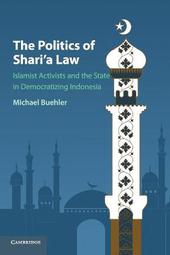
|
The Politics of Shari'a Law: Islamist Activists and the State in Democratizing Indonesia
Paperback / softback
Main Details
| Title |
The Politics of Shari'a Law: Islamist Activists and the State in Democratizing Indonesia
|
| Authors and Contributors |
By (author) Michael Buehler
|
| Physical Properties |
| Format:Paperback / softback | | Pages:284 | | Dimensions(mm): Height 230,Width 150 |
|
| ISBN/Barcode |
9781107571167
|
| Classifications | Dewey:297.272 |
|---|
| Audience | | Professional & Vocational | |
|---|
| Illustrations |
2 Tables, black and white
|
|
Publishing Details |
| Publisher |
Cambridge University Press
|
| Imprint |
Cambridge University Press
|
| Publication Date |
8 March 2018 |
| Publication Country |
United Kingdom
|
Description
The Islamization of politics in Indonesia after 1998 presents an underexplored puzzle: why has there been a rise in the number of shari'a laws despite the electoral decline of Islamist parties? Michael Buehler presents an analysis of the conditions under which Islamist activists situated outside formal party politics may capture and exert influence in Muslim-majority countries facing democratization. His analysis shows that introducing competitive elections creates new pressures for entrenched elites to mobilize and structure the electorate, thereby opening up new opportunities for Islamist activists to influence politics. Buehler's analysis of changing state-religion relations in formerly authoritarian Islamic countries illuminates broader theoretical debates on Islamization in the context of democratization. This timely text is essential reading for students, scholars, and government analysts.
Author Biography
Michael Buehler is a Senior Lecturer in Comparative Politics in the Department of Politics and International Studies, School of Oriental and African Studies (SOAS), University of London. Specializing in Southeast Asian politics, his teaching and research interests evolve around state-society relations under conditions of democratization and decentralization. Previously he taught at Columbia University, New York and Northern Illinois University. He has also held research fellowships at the Center for Equality Development and Globalization Studies at Northwestern University, Illinois, the Weatherhead East Asian Institute. New York, and the Royal Netherlands Institute of Southeast Asian and Caribbean Studies, Leiden. Michael Buehler has been an Associate Research Fellow at the Asia Society in New York City since 2011.
Reviews'Buehler's provocative study asks us to think twice before making facile assumptions about political parties, civil society and 'Islamisation' in post-Soeharto Indonesia. His conclusions will not go unchallenged, but the scholarship is superb, and the richness of the data, in terms of both geographic scope and historical depth, makes for a fascinating study about how old elites try to manipulate new sources of political legitimacy in a democratizing state. Buehler shows how a partnership of political opportunists and pious activists can produce Islamist outcomes without strong Islamic political parties. This is a book guaranteed to stimulate argument and debate.' Sidney Jones, Director, Institute for Policy Analysis of Conflict, Jakarta 'This is an excellent study of local politics and the dynamics of Islamisation in Indonesia in the years of post-authoritarian transition. Based on detailed case studies, Buehler provides a convincing explanation of the seeming paradox that Islamist political parties performed poorly in elections but the Islamisation of public life was in fact carried forward by secular local politicians, many of whom still belonged to the elite of the ancien regime. His observations on how democratisation enabled vocal (Islamist) pressure groups based outside the political system to have a greater impact on decision-making than Islamist parties within the system have relevance beyond the specific case of Indonesia.' Martin van Bruinessen, Universiteit Utrecht, The Netherlands 'Michael Buehler has produced a fine piece of scholarship on contemporary Indonesian politics that engages several important literatures - religion and politics, democratic transitions, social movement theory, and questions of democratic representation and accountability. This book is excellently researched, focusing on historically grounded case studies across multiple regions. Buehler examines a curious puzzle: Islamic parties and candidates have not fared well in Indonesian elections since 1998, and yet there has been a surge in Islamic laws at the local level championed mostly by vote-hungry candidates from non-Islamic parties. He emphasizes the short-term strategizing and competition among political elites who do not intend Indonesia to become an Islamic state, even if the effect of their opportunistic electoral politics across several regions nudges the country increasingly in that direction. Buehler advances a bold thesis that is illuminating not only for Indonesia, but for other Islamic countries as well.' Jeffrey Winters, Northwestern University, Illinois 'Who is pushing most for new shari'a regulations in Indonesia? To address this question Buehler has created a pioneering data set on 443 shari'a regulations which he adroitly analyses with a rich range of concepts. Buehler counterfactually shows that almost all of these shari'a regulations have been passed by secular bureaucrats who were looking to get some political, and often financial, gain. He also illustrates that one of the reasons for the decline of total vote of Islamic political parties is that they are ideologically multi-vocal and join many different competing party coalitions, often with secularist allies. Buehler's book, based on over fifty months of theoretically sensitive field research, has resulted in a wonderful conceptual and empirical enrichment to the literature on democracy and Islam.' Alfred C. Stepan, Wallace S. Sayre Professor of Government, Founding Director of the Center for the Study of Democracy, Toleration and Religion, and Co-Director of the Institute for Religion, Culture and Public Life, Columbia University, New York
|